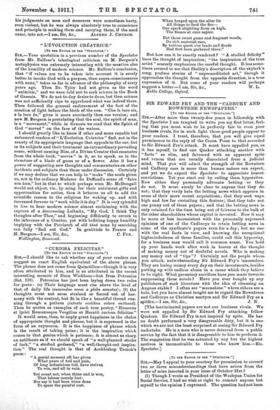" L'EVOLUTION CREATRICE." uro TEE EDITOR 07 TER "EPECTATOR."
SIR,—Your quotation in a previous number of the Spectator from Mr. Balfour's teleological criticism on M. Bergson's metaphysics was extremely interesting with the mention also of the humility of modern science. Mr. Balfour's conclusion, that " if values are to be taken into account it is surely better to invoke God with a purpose, than supra-consciousness
with none," takes us far in advance of the philosophy of sixty years ago. Then Dr. Tylor had not given us the word " animism," and we were told not to seek science in the Book of Genesis. We do not to-day desire to do so, but then science was not sufficiently ripe to apprehend what was indeed there. Then followed the general endorsement of the fact of the creation of light before the birth of the sun. "Cbe la Ince sia, e la Ince fu," gives it more succinctly than our version; and now M. Bergson is postulating that the soul, the spirit of man, is a "movement," while in Genesis we read that the Spirit of God " moved " on the face of the waters.
I should greatly like to know if other and more capable but entranced readers of " Ltvolution Creatrice " find, not in the beauty of its appropriate language that appeals to the ear, but
its subjects and their treatment an extraordinary pervading sense, without naming Him, of a Divine Creator that emanates from the whole book, " moves " in it, so to speak, as in the structure of a blade of grass or of a flower. Also it has a power of suggesting new thoughts and commentaries on other incidents and subjects than those under discussion. Certainly if we may deduce that we can help to " make " the souls given us, not in the ordinary Madame du Deffand's sense of "faire son &me," but in that to which perhaps even Mr. McDougall would not object, viz., by using for their nutriment gifts and opportunities for action, then it behoves us all to add the scientific reason to the religious for waking up, and with increased fervour to "work while it is day." It is very splendid to live to hear modern science almost exclaiming with the rapture of a discovering Leibnitz, "My God, I think Thy thoughts after Thee," and beginning diffidently to return to the inference of a Creator, yet with befitting happy humility implying with the Patriarch of old that none by searching can fully "find out God." In gratitude to France and






































































 Previous page
Previous page